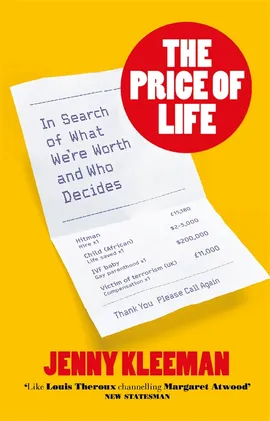We normally believe that human life is precious and priceless. This is a moral standard cherished since at least the authors of Jeremiah and Luke set pen to parchment.
Jeremiah 1:5 “Before I formed you in the womb, I knew you, and before you were born I consecrated you.” Luke 12:7 “Why even the hairs on your head are all numbered.”, written in circa 605 BC and circa 90 AD respectively.
Journalist and author Jenny Kleeman (Jenny Kleeman) finds that this moral standard is not upheld in our world. The cost of saving a life, creating a life or compensating for a life taken is routinely calculated and put into practice. In a world obsessed with data, it is possible to run a cost-benefit analysis on anything – including human life. For philanthropists, judges, criminals, healthcare providers and government ministers, it has become routine to calculate the value of human lives. They have a price.
This book is a tour of encounters with people who have to make decisions affecting human lives. Often the effective choice is about who will live and who will die.
One chapter concerns the price of a slave. In the UK today, the average amount paid for a female trafficking victim is £3,000 to £4,000, while in some parts of the world a person can be bought for as little as $400. Sadly, this is much less than was paid when slavery was legal. A male slave in ancient Egypt cost the equivalent of £25,000 today, while a ‘prime male field hand’ in the southern states of America cost the equivalent of £31,000.
Another example is health care. In the UK, the National Institute for Health and Care Excellence (NICE) works out how many quality-adjusted life years (QALYs) a treatment is likely to add. If a drug costs £20,000 to £30,000 per QALY, it’s deemed to be worth it. It turns out that no one can give an economic or medical justification for this figure. It works out as much lower than the amount the country ended up spending to save lives during the Covid-19 pandemic. In total, lockdowns cost the nation £180,000 for every life year that they saved. Politicians have to ask if this was good value, so as to be ready to decide what to do when we face the next pandemic.
All this illustrates that having ideals is laudable, but practical moral decisions are excruciating.
Kleeman summarises her critique of the moral logic at play in this sentence: ‘No human being is an altruism computational device, an instrument for maximizing good. We help others not just to save crude numbers of lives, but to create the world we want to live in.’
Check if this thought provoking work on modern society is in stock at your local library Home | South Lanarkshire Libraries (sllclibrary.co.uk)
352 pages in Picador
ISBN-13 : 978-1035004966
First published 2024



